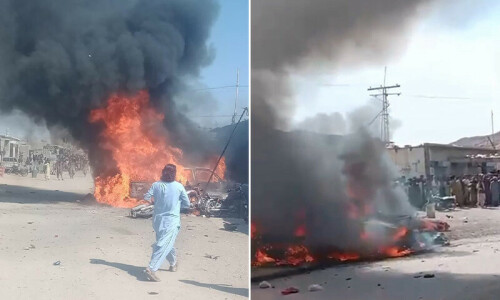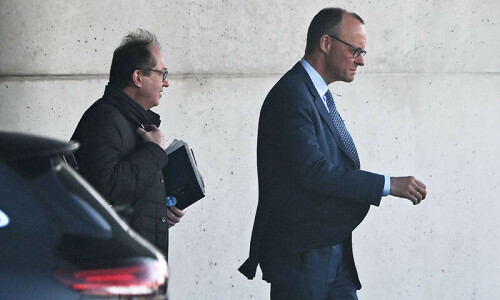 UEBERLINGEN (Germany), July 2: At least 70 people, including 52 children, died after a Russian passenger plane collided with a cargo jet over southern Germany on Monday night.
UEBERLINGEN (Germany), July 2: At least 70 people, including 52 children, died after a Russian passenger plane collided with a cargo jet over southern Germany on Monday night.
Swiss air traffic controllers said the pilot of the Tupolev TU-154 passenger jet carrying Russian children to a holiday in Spain from Moscow reacted too slowly to repeated warnings to reduce altitude before colliding with the cargo plane operated by international courier company DHL.
Officials said on Tuesday the two aircraft crashed in mid-air at 2140 GMT (3.40am PST Tuesday) above Lake Constance on the German-Swiss border, spreading debris over a wide area and setting a number of buildings, including a school, on fire.
“I was lying in my bed, saw a ball of fire in the sky and ran out onto the balcony. Behind the forest it looked like a fireworks display was going off,” said Klaus-Dieter Schindler, janitor at a school in the village of Owingen.
“In the glow of the fire I saw wreckage falling out of the sky. It looked like black rain,” he said. The landing gear of the Tupolev lay burning just a few hundred metres away.
The two jets were both diving to avoid a crash when they flew into each other, Swiss air traffic controllers who were monitoring the flights said.
The pilot of the Tupolev 154 Russian passenger jet started a steep dive only after Swiss controllers had instructed him to do so three times, Anton Maag an official from Skyguide, the Swiss air traffic controllers who were monitoring the flights, said at a news conference.
He said it was unclear why it took so long for the jet to respond to increasingly urgent instructions.
The Boeing 757 cargo plane started to dive when its on-board warning system instructed the pilot to drop altitude to avoid a crash, he said. If the Boeing had maintained its course, “there certainly would not have been a crash,” he said.
Hans-Peter Walser, regional police chief in the southwestern German city of Ueberlingen, said: “At the moment there are no reasons to believe this has a criminal background.”
SEARCH FOR REMAINS: Officials said 12 crew and 57 passengers on board the Tupolev were all Russians. Moscow’s Domodedovo airport said about 50 of them were under 18 years old.
Authorities at the Barcelona airport said the wife and two children of a Russian man resident near Barcelona were among those on the charter flight. An employee at the four-star Hotel Estival in the Catalan coastal town of Salou said they were expecting a group of Russian children.
A spokesman said a Briton and a Canadian were piloting the cargo plane, which was operated by DHL Worldwide Express.
Rescue workers found 11 bodies and the Tupolev’s flight data recorder, vital for investigating the accident. No one on the ground was believed killed.
Helicopters equipped with infra-red cameras clattered overhead as 500 rescue workers combed the area seeking victims and examining wreckage strewn over an area about 40kms long. Some 15 boats criss-crossed the lake.
“We’ve got body parts here,” one official called through on a police radio overheard on the scene.
Officials warned locals that human remains could be strewn across a wide area of the resort region on the Swiss border.
Reporters on the scene saw the charred tail of the Russian plane in a field surrounded by apple trees _ about a short walk away from what appeared to be part of the wing.
The airline, based in Russia’s oil-rich Muslim Republic of Bashkortostan, was one of many to emerge from the breakup of state airliner Aeroflot after the collapse of the Soviet Union.
It relies mainly on a fleet of Tu-154s, one of the most common Russian planes used for medium-range flights.
The two planes were flying at an altitude of 12,000 metres above Ueberlingen, on the northwestern end of Lake Constance, when they collided, officials said. The area was important in early aviation history as the site of the first Zeppelin airship flights more than 100 years ago.
“What I saw looked like a big dark orange light that lasted several seconds and changed in size, first big then small,” one eyewitness told German radio.
A spokeswoman for German flight control said one of two reasons would explain such a crash: either ground controllers had entered incorrect data for the flight paths, or one of the two planes had failed to follow its approved flight path.
Another spokesman said there had been no problems contacting the Tupolev while it was in German airspace. A DHL spokesman said there were no problems with their plane before the crash.
Both planes were under Swiss flight control in Zurich at the time of the accident.—Reuters
















































